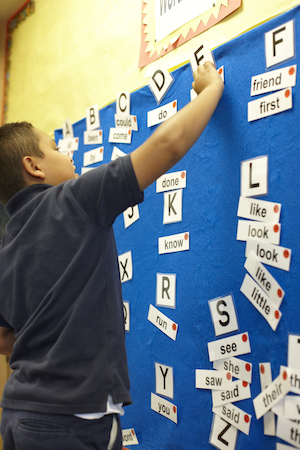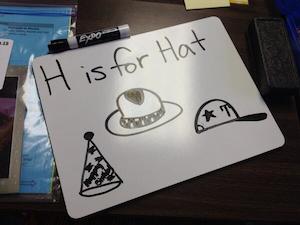
At-home strategies for building foundational reading skills
December 7, 2015
Director of Curriculum and Instruction, Reading Partners
Nowadays, learning to read starts before kids enter the kindergarten classroom. You can start your child off on the right foot by practicing simple, foundational reading skills at home and during everyday activities and play.
If your child is a pre-reader or is not yet reading independently, there are fun and engaging activities you can do to prepare them for reading instruction. These activities can also be beneficial for older students who are still struggling with the basics of reading on their own.
Build your child’s vocabulary
 Talk with your child and describe everything and anything. Yes, as a parent of a preschooler myself, I know this can be exhausting. But the more you talk with your child, the better their vocabulary will be, and the more they will understand what they read.
Talk with your child and describe everything and anything. Yes, as a parent of a preschooler myself, I know this can be exhausting. But the more you talk with your child, the better their vocabulary will be, and the more they will understand what they read.
Describe things in real (adult) terms. Children need multiple exposures to new words in order to learn the meaning and be able to apply them. There’s no need to simplify vocabulary for your child. Using a common, adult word is a learning opportunity. For example, when a swing is available at the park, you can say “It looks like that swing is available for you!” While “open” or “ready” are effective synonyms, don’t let the learning moment pass you by. There are teachers who always talk about “ascending” and “descending” the stairs in the school building — what an easy way to teach some great vocabulary!
Help your child become aware of sounds in words
Read rhyming books. Your local library is a great resource as these books are often shelved separately. When your child is familiar with a book, leave off the last word in a rhyme and have him or her complete the sentence. For example, “One, two, buckle my …”
Play with the sounds in words. These are great activities to do when you are in transit in a car or on a bus.
- Look for objects you can both see, say the word in syllables (for example, bill-board or am-bu-lance), and have your child guess the word.
- Say the first sound of a word separate from the rest of the word (for example, s-ock or l-adder) and have your child guess the word.
- As your child gets better at putting the sounds together to figure out the word, challenge him or her to break apart words for you to guess.
Point out and practice letter names and sounds
The easiest trick here is to sing the ABC song. Often! Another fun way to reinforce this skill is to teach your child the letters in his or her name and look for those letters everywhere you go. As those letters become easy for your child, add more for names of siblings, pets, or other important people/objects in their life.
 Each time you find a letter and your child names it, tell them the sound for the letter as well. Have them repeat it and see if they can think of other words that start with the same sound.
Each time you find a letter and your child names it, tell them the sound for the letter as well. Have them repeat it and see if they can think of other words that start with the same sound.
Build comprehension of books
Discussing a book will be less complex for pre-readers, but you can still ask both literal and inferential questions. Re-read favorite books until your child can retell or “read” them on their own by using the pictures. Ask them deeper questions about why characters acted in certain ways or how they can connect books to their own experiences.
Many of these strategies are built into the Reading Partners curriculum, and the one-on-one experience with a tutor gives a student valuable experience with these foundational reading skills. When you sign up to volunteer with Reading Partners, you will have the incredible opportunity to support a child as they grow as a reader, building both their skills and a lifelong love of reading!



